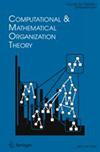Democratizing Work: Redistributing power in organizations for a democratic and sustainable future
IF 1.5
4区 管理学
Q3 COMPUTER SCIENCE, INTERDISCIPLINARY APPLICATIONS
Computational and Mathematical Organization Theory
Pub Date : 2022-01-01
DOI:10.1177/26317877221084714
引用次数: 12
Abstract
Environmental destruction and social inequalities are increasingly urgent challenges. How can corporations, which have played a key role in creating and reproducing these problems, be part of the solution? In this paper, we advance that a shift to more democratic forms of organizing within corporations may be an important part of this transition. We first review scholarship on the disempowerment of workers. We then make the case for democratizing organizations, arguing that workers need to participate in firm decision-making so they can protect their rights and interests. We further suggest that democratic organizing practices may enable corporations to successfully pursue social and environmental objectives alongside financial ones, which is also important for addressing societal challenges. We then propose a research agenda for studying the democratization of organizations and its implications. In doing so, we highlight how organization scholars can build on prior research on democratic forms of organizing and draw from extant social science research outside of mainstream management scholarship. We conclude by calling for research that will document, and help us better understand, what it takes to develop democratic and sustainable organizations and societies.工作民主化:在组织中重新分配权力,以实现民主和可持续的未来
环境破坏和社会不平等是日益紧迫的挑战。在制造和再现这些问题中扮演关键角色的企业如何成为解决方案的一部分?在本文中,我们提出,向企业内部更民主的组织形式转变可能是这一转变的重要组成部分。我们首先回顾一下关于工人被剥夺权利的学术研究。然后,我们提出了民主化组织的理由,认为工人需要参与公司的决策,这样他们就可以保护自己的权利和利益。我们进一步建议,民主组织实践可能使公司能够成功地追求社会和环境目标以及财务目标,这对于解决社会挑战也很重要。然后,我们提出了研究组织民主化及其影响的研究议程。在此过程中,我们强调组织学者如何建立在先前对民主组织形式的研究基础上,并从主流管理学术之外的现有社会科学研究中汲取经验。最后,我们呼吁开展研究,记录并帮助我们更好地理解,发展民主和可持续的组织和社会需要什么。
本文章由计算机程序翻译,如有差异,请以英文原文为准。
求助全文
约1分钟内获得全文
求助全文
来源期刊

Computational and Mathematical Organization Theory
COMPUTER SCIENCE, INTERDISCIPLINARY APPLICATIONS-MATHEMATICS, INTERDISCIPLINARY APPLICATIONS
CiteScore
3.80
自引率
16.70%
发文量
14
审稿时长
>12 weeks
期刊介绍:
Computational and Mathematical Organization Theory provides an international forum for interdisciplinary research that combines computation, organizations and society. The goal is to advance the state of science in formal reasoning, analysis, and system building drawing on and encouraging advances in areas at the confluence of social networks, artificial intelligence, complexity, machine learning, sociology, business, political science, economics, and operations research. The papers in this journal will lead to the development of newtheories that explain and predict the behaviour of complex adaptive systems, new computational models and technologies that are responsible to society, business, policy, and law, new methods for integrating data, computational models, analysis and visualization techniques.
Various types of papers and underlying research are welcome. Papers presenting, validating, or applying models and/or computational techniques, new algorithms, dynamic metrics for networks and complex systems and papers comparing, contrasting and docking computational models are strongly encouraged. Both applied and theoretical work is strongly encouraged. The editors encourage theoretical research on fundamental principles of social behaviour such as coordination, cooperation, evolution, and destabilization. The editors encourage applied research representing actual organizational or policy problems that can be addressed using computational tools. Work related to fundamental concepts, corporate, military or intelligence issues are welcome.
 求助内容:
求助内容: 应助结果提醒方式:
应助结果提醒方式:


